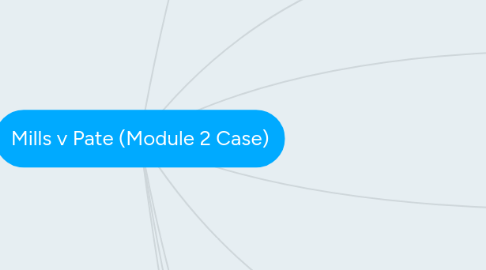
1. Facts
1.1. Parties
1.1.1. Mills, plantiff
1.1.2. Dr. Pate, defendant
1.2. Where
1.2.1. Court of Appeals, El Paso, TX
1.3. What happened
1.3.1. Pate performed several procedures on Mills in an effort to slim her midsection that failed to produce the desired results
1.3.1.1. Pate first performed liposuction, telling Mills this procedure would be all she needed to achieve her desired results
1.3.1.1.1. Mills had a saggy, bumpy, and baggy stomach
1.3.1.1.2. Pate told Mills if she paid for a thigh lift he would "touch it [her baggy midsection] up"
1.3.1.2. Pate performed the purchased thigh lift and the midsection "touch up"
1.3.1.2.1. Mills remained unhappy with the second procedure results and sued Dr. Pate
1.3.1.3. Mills ultimately had to pay for another surgeon to perform the procedure needed to give her desired results
1.4. Procedural History
1.4.1. 346th District Court granted summary judgement to Pate
1.4.1.1. Mills appealed
2. Issue Before the Court
2.1. whether Pate was negligent in failing to disclose the risks of multiple procedures being needed and failing to obtain her informed consent
2.2. whether Mills could file claim of breach of express warranty
2.2.1. or, does plaintiff also need to prove defendant deviated from acceptable standards of medical care?
3. Application
3.1. Negligence for failure to disclose risks, failing to obtain informed consent
3.1.1. (1) Statute of limitations had expired on first liposuction procedure [source - legal
3.1.2. (2) Court ruled that the consent form Mills signed prior to the second procedure constituted informed consent and disclosed the specific risks brought forward in the suit (the procedure might not result in her desired results)
3.2. The court ruled that Mills' claim of breach of express warranty was valid
3.2.1. In Sorokolit, court had found a breach of express warranty claim does not require the plaintiff to prove defendant failed to meet acceptable standards of medical care
4. Conclusion
4.1. Upheld in part, reversed in part.
4.1.1. Upheld the rulings against negligence for failing to disclose risks and failing to obtain informed consent
4.1.2. Reversed ruling against claim for breach of express contract
